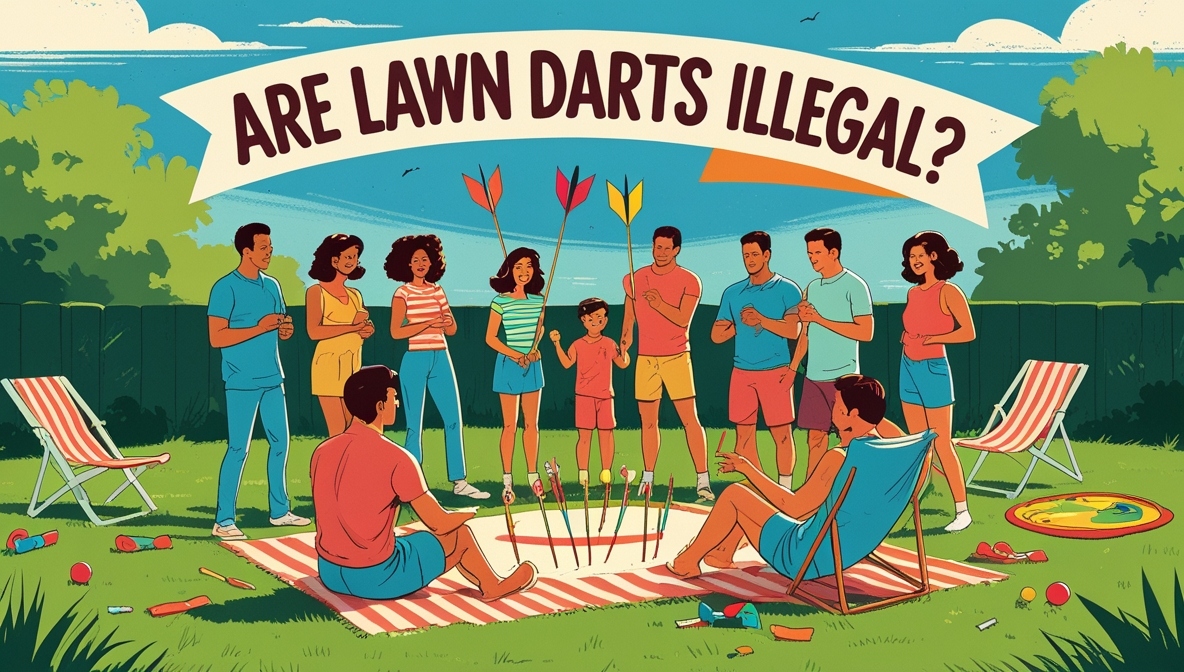Lawn darts, a popular outdoor game, often involves a combination of skill and luck. The game typically involves throwing darts at targets set on a playing field. However, the legality of this seemingly simple activity can be surprisingly complex, varying based on local regulations. This article will explore the legal landscape surrounding lawn darts, examining the factors that determine whether or not they are permissible in a given location.
Contents
Lawn Darts: A Legal Overview
Generally, lawn darts are not inherently illegal. The game itself, as a recreational activity, isn’t prohibited at a federal level in most countries. However, the legality hinges on the manner in which it’s played and the specific regulations in place. This often translates to a lack of national standards, making the legality of the activity highly dependent on local authorities. The inherent potential for harm, if the game is mishandled or played irresponsibly, is a factor that local ordinances will often consider.
The lack of federal regulation allows for diverse approaches to lawn darts by individual states. Some states might have no specific laws on the topic, leaving it to local jurisdictions to decide. This can lead to a significant disparity in rules across different areas. The absence of a universal law can create confusion for those who want to play the game. The focus often remains on safety and the potential for damage to property.
Liability and personal injury are critical factors in determining whether lawn darts are permitted. The potential for someone to be injured by flying darts, or for the darts themselves to damage property, is a concern that local governments must address. This is why specific regulations exist in many locations.
While a general “no” can’t be given to the question of whether lawn darts are illegal, it’s crucial to remember that their legality isn’t absolute. The specifics of where and how they’re played will determine whether or not they are permitted in a given location.
State Laws Vary Widely
Some states have laws that directly address lawn dart games, while others do not. States with a high density of recreational areas might have more comprehensive guidelines, whereas those with less emphasis on outdoor activities might have less stringent laws. The diversity in state laws mirrors the varied approaches to recreation and public safety across the country.
State laws often focus on the potential hazards of the game, including the possibility of injury from flying darts or damage to property. Laws that address the specific design or materials of lawn darts are rare, but are certainly a consideration in some jurisdictions. These laws might also address the need for designated playing areas to control the potential for harm.
The varying enforcement of these laws creates a situation where compliance can be complicated. Different jurisdictions might interpret similar laws in different ways, leading to ambiguity and potential non-compliance even in areas where rules exist. It’s worth noting that enforcement can be inconsistent depending on the priorities of local law enforcement.
Furthermore, some states may have broader public safety regulations that indirectly impact the legality of lawn dart games. Such regulations might touch upon safety equipment required for outdoor activities or the need to ensure proper supervision in public spaces.
Local Ordinances Play a Role
Local ordinances often provide the most specific regulations regarding lawn darts. These ordinances will often be more nuanced and tailored to the specific local context. For example, areas with large parks or public spaces may have more explicit rules than residential areas.
Local ordinances might specify where lawn darts can be played, setting aside designated areas or prohibiting them entirely in certain zones. The presence of nearby structures or high-traffic areas can influence local regulations. This is why someone considering playing lawn darts should check local regulations.
There can be specific restrictions on the playing time for lawn darts. Some jurisdictions might limit the hours during which the game is permitted, particularly in residential areas. The potential for noise complaints or disturbance to neighbors is a common concern that influences local rules.
Moreover, regulations might pertain to the supervision of players, especially in areas where children are present. These ordinances help to ensure the safety of everyone in the vicinity.
Penalties for Illegal Use
Penalties for violating local ordinances concerning lawn darts vary widely, depending on the severity of the violation. These penalties can range from warnings to fines, potentially even leading to the seizure of equipment.
The potential fines for playing lawn darts illegally can be substantial, particularly in jurisdictions that prioritize public safety. The amount of the fine can vary significantly based on the specific rules and the level of the violation. This variability makes it crucial to understand local regulations before playing.
Depending on the nature of the violation, repeated offenses could lead to escalating penalties. This is similar to other violations and emphasizes the importance of compliance. A pattern of non-compliance might lead to more severe consequences than a first-time offense.
Specific penalties will be detailed in local ordinances. Failing to check these before engaging in the activity could lead to unexpected costs.
In conclusion, the legality of lawn darts is not a straightforward yes or no answer. It’s heavily dependent on the specific location, state regulations, and local ordinances. Before engaging in a lawn dart game, it’s essential to thoroughly research and understand the applicable rules to avoid any potential legal issues. Knowing the local laws and regulations is crucial to ensure a safe and enjoyable experience for everyone involved.






